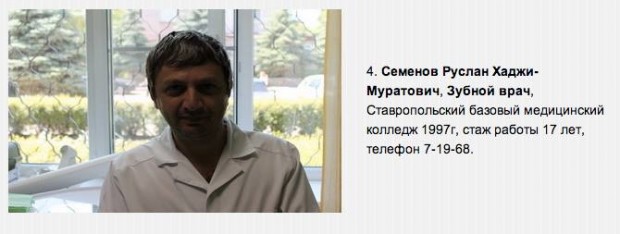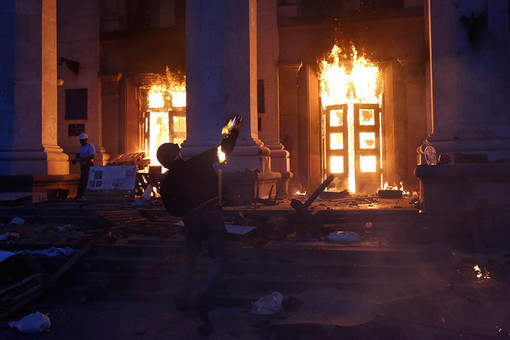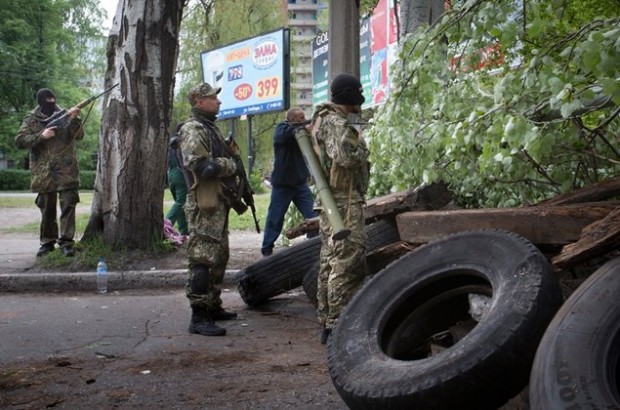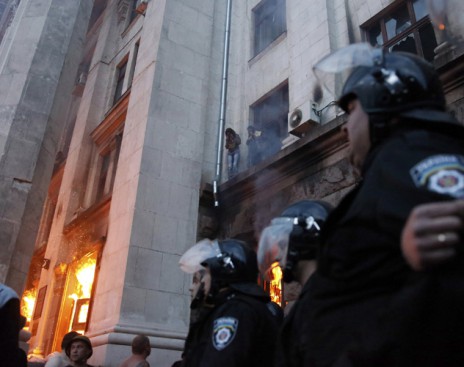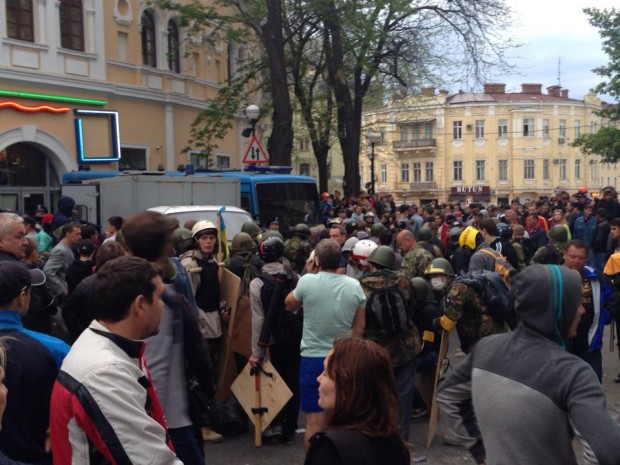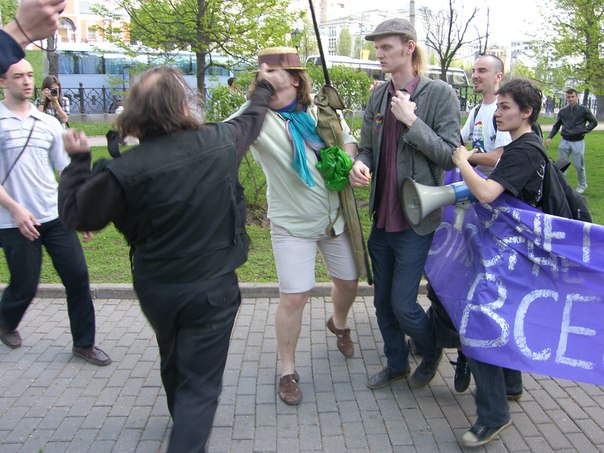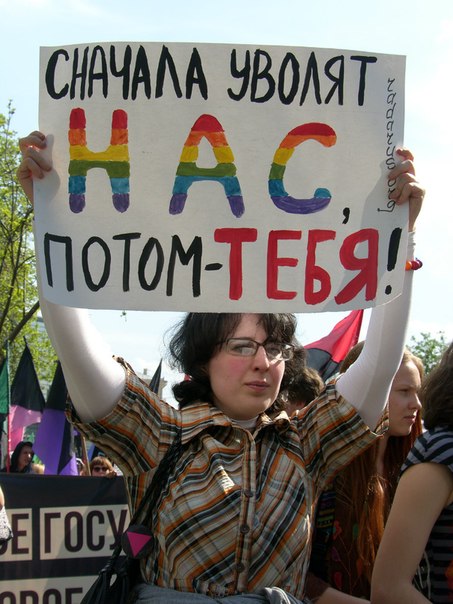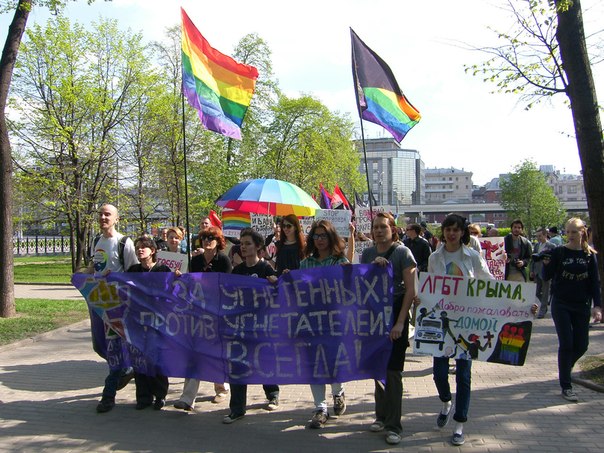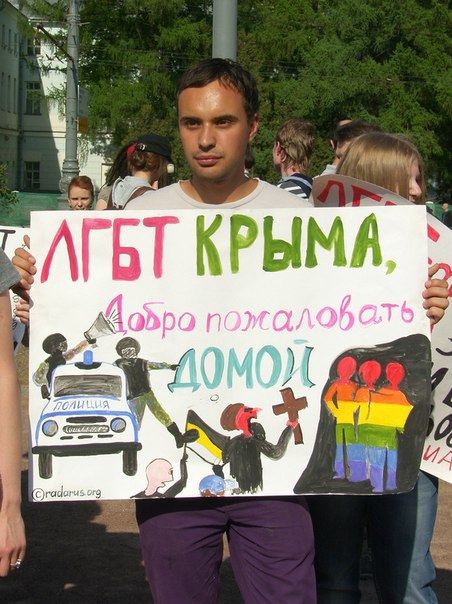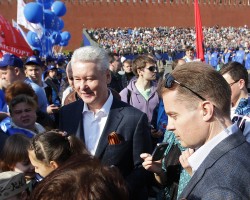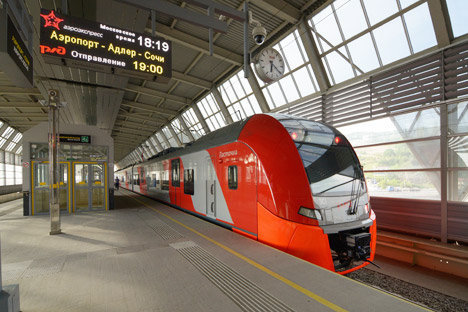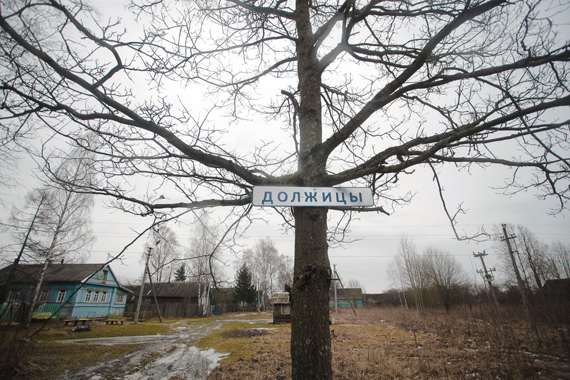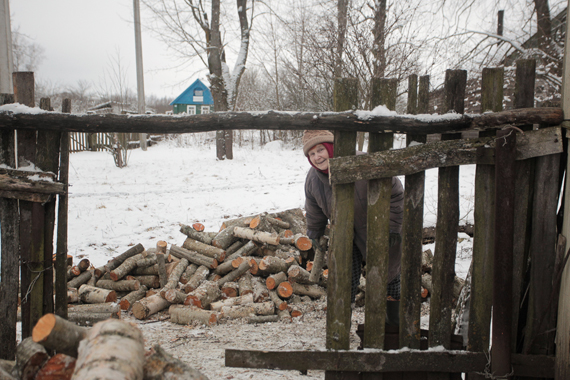Updated Daily. The tragic deaths of 46 people in clashes in Odessa and the fire at the Trade Unions Building have received wide coverage in the Russian media and blogosphere, but from diametrically opposed perspectives, depending on the degree of independence from the state and degree of sympathy with the EuroMaidan movement versus the Kremlin-backed Russian separatists in Ukraine.
While 100,000 marched in official May Day parade on Red Square with aggressive patriotic messages, an LGBT contingent that tried to stage a parade was attacked first by Russian Orthodox activists then detained by police. If in Mussolini’s dictatorship the trains ran on time, in Putin’s Russia, the trains are increasingly running at a loss, the revenue from online ticket sales is being siphoned off to the railroad’s CEO and his family, and service has been removed in remote areas leaving people cut off from the outside world. Putin has pushed through legislation to further control the Russian Internet, and is now reportedly preparing new measures to create a “sovereign Internet” free of what he sees as pernicious Western influences from the “CIA-created” Internet. New US sanctions against Russia this week hit closer to Putin’s immediate circle, and struck harder at the economic and political forces that keep him in power.
Go here, here, and here, for past issues of our weekly. This blog will chart throughout the week what’s happening in Russia.
Please help The Interpreter to continue providing this valuable information service by making a donation towards our costs.
May 4, 2014
2100 GMT: The debate continues on Russian independent news sites and social media over various versions of what happened in Odessa Friday, when 46 people were killed in clashes between pro-Russian separatism and pro-Ukrainian unity forces.
Svetlana Gannushkina, a respected Moscow human rights advocate whose Civic Action is the leading defender of migrant laborers and refugees in Russia, posted the story of “our Ukrainian colleague on the tragic events in Odessa.” The Interpreter has translated an excerpt:
“In the [Trade Unions] building were those who had shot and even continued to shoot during the fire. They had attacked a column of demonstrators who had no means of defense or attack. The first four people who died were victims of that attack; moreover, there were many wounded. And then the infuriated crowd broke up stones from the pavement and began throwing them at the attackers, forcing them to run, and then chased them. They set the tent camp on Kulikovo Field [Square] on fire. Several dozen people ran into the Trade Unions Building.
Odessians claim that the building caught on fire due to Molotov cocktails which separatists threw from the top down on the Maidan activists. This appears to be true — it can be seen in the video that the fire near the building jumps to the building itself. Whether the attackers had Molotovs or not I don’t know. In general a lot if not clear. One thing is clear, there are a lot of victims — 46 people in total died, and of these, 30 died from carbon monoxide asphyxiation, 8 jumped from the 4th floor and died immediately or soon after. More than 20 people were saved by firemen, several others were rescued by climbing down ropes that people at whom they had just been shooting at threw to them. There are 214 injured; 88 hospitalized; 18 are in serious condition; 3 died after the jump from the 4th floor, one from a gunshot wound, one from burns. We are in total shock from these events. A two-day mourning period has been declared.”
Andrey Kamenschikov disputes the version from Gannushkina’s colleague based on a close examination of live videos from the scene:
“There is a video where it is visible how people who have surrounded the building are throwing Molotov cocktails into it (that doesn’t rule out, of course, that cocktails were flying from both sides), there are also videos where people from the street are firing at the building from a pistol (I don’t know whether a combat weapon or a traumatic pistol). Again, it seems as if gunfire was coming from inside also, it is not clearly visible in the video. And if not everybody has them, many do have sticks, shields, and so on.”
Dmitry Lihachev also disputes the story, based on watching several hours of the live-stream video from the scene:
“This was a pogrom, people went to burn and kill — and they burned and killed. I didn’t see any connection between those ‘Colorado Beetles’ [pro-Russians with orange-and-black striped St. George ribbons] who threw something from behind the police cordon in the center and the tent camp — I can readily believe that these are simply different people. Maybe some Odessians did see that the Colorados set themselves on fire in the Trade Unions Building, but I saw how they set fire from all sides […] I saw how they did not allow the ambulances through, and how they shouted ‘To Heroes Glory!’ even when they saw several corpses, and young girls with bats, and I heard the commentaries, and this was appalling, Svetlana, this was simply a pogrom — in the best traditions of the early last century.”
Dozens of others argue the elements of the incidents pro and con, with some pointing out that it would be hard for a Molotov cocktail thrown from the roof to bounce inside a window to start a fire, and also hard to throw a Molotov cocktail from the street and have it reach an upper floor of the building to catch a room on fire. Others cited a video that purports to show how Ukrainian nationalists beat up Russian separatists even after they escaped from the building:
Gannushkina followed up with insistence that her source would not distort the story, and then posted a link to the eye-witness account of Vladimir Golyshev published by Ekho Moskvy
Golushev says that even with a lot of live-stream videos available, there are still disputes. His claims that the police not only “did nothing” but took the side of the pro-Russian forces are bolstered by this video, in which helmeted riot police are seen first linking arms to keep back a mob, then letting through people with St. George ribbons and bats:
But Lihachev said that this brief slice of events was still short on real proof that the police were actively and deliberately colluding with separatists everywhere, much less under orders from Russian-backed authorities.
2039 GMT: A Russian social media fake has been debunked, but unfortunately has stirred up hatred — and then undermined belief in eye-witness accounts of events in Ukraine along the way.
Last night, various Facebook comments appeared, notably in response to an expression of condolence from former US ambassador to Moscow Michael McFaul, quoting a Jewish doctor in Odessa, Igor Rozovskiy. The doctor claimed he had tried to reach victims inside the burning Trade Unions Building in Odessa, but was beaten by Maidan activists and ultranationalists who supposedly warned him of future attacks on Jews.
The Facebook account of the doctor with posts in in English and Russian was made only hours before his first post, and the picture uploaded for the account was darkened:
The doctor published what he claimed was an eye-witness account (translated by The Interpreter) of the tragedy:
“I saw a young man who could have been saved, if I could have taken him to the hospital, but all my efforts to persuade ended with a punch in the face and the loss of my glasses.
For 15 years I saw a lot, but yesterday I wanted to cry, not from pain or humiliation, but from helplessness to do something. In my city what has happened did not occur even during the fascist occupation. I ask the question, why is the whole world silent?”
But today, Arthur Welf, a Russian Facebook developer, researched the profile used for “Igor Rozovskiy” and pronounced it “a creature of Yegor Kholmogorov, a well-known nationalist and co-founder of Russian nationalist media Sputnik & Pogrom (sputnikipogrom.com)” — a site known for such disinformation. He pointed out the real identity of the same man in the picture, Ruslan Haji-Muratovich Semyonov, a dentist:
In fact, judging from this page of dental specialists found through image search, Semyonov’s picture — and identity — appear to have been stolen for the purposes of making this crude hoax, as he is not located in Odessa nor has he commented on the situation in Ukraine.
0800 GMT: Ekho Moskvy, an independent radio station which has recently come under government pressure and dropped some opposition bloggers to avoid being blocked by the state censor, ran the blog post of Sofiya, a doctor an eyewitness to the Odessa fire who did not give her last name, “I Was There, In the Burning Trade Unions Building.” The Interpreter has translated an excerpt:
“I almost suffocated…the firemen took unforgiveably long, about 20 minutes, and I believe that was absolutely no accident. Like it was no accident that the police were completely missing. when I was rescued, there were no police, people without uniforms helped me climb down — apparently simply civilians.
Why did people end up there? Because the ultras [soccer fans] began to run from everywhere along with the other ‘patriots of Ukraine’ with sticks, stones, chains, and Molotov cocktails. there was nowhere to get away, because people were simply driven into a trap. The people whom I saw were very poorly armed, if this could be called armed: sticks, bats, pieces of boards. That’s it. there were no firearms or anything like that. There were many women, elderly people, who had come to help with medicines, ordinary Odessians (and I emphasize this! not professional military, mercenaries or foreigners!). That is what I saw myself on those floors where I was (second or third floors).
Very soon a Molotov cocktail flew in the window, and a fire broken out in the hallways. There was a fire-extinguisher, but they didn’t manage to localize the conflagration. I and about 10 other people hid from the fire in one of the offices, it was black from smoke and there was nothing to breathe, everyone lay down on the floor where there was air left suitable to breathe. Nearby people groaned, prayed and called their families and told them to call the fire department. The situation was even worse in the hallways, since in our office, the window was open through which at least some fresh air could get in. We phoned and waited but there was no helped, my relatives said that they were not picking up the phone at the fire department and it was constantly busy.
About 20 minutes later they threw up a rope to us, it was tied to a radiator, and people began gradually to lower themselves down. People without uniforms stood below on garbage gans, who helped us to get down, since the floors were high up and we could have simply been smashed. I didn’t see who climbed down afer me, since people were ill, some people’s phones rang but the owner didn’t answer.
After getting down, people gave me water, and the Maidan supporters began bother me, but I managed to get away from the [Kulikovo] field, before the ‘Europeans’ and ‘democrats’ began beating the survivors simply for the fact that they survived and didn’t burn alive.”
A user named syd_barrett, noted:
“This tragedy could have been avoided if the police had not behaved like a herd of sheep, and had cut off the actions of the Colorado Beetle assailants harshly. They were poorly armed (clubs, wire, flash grenades, trauma pistols) and they attacked unarmed people with Ukrainian flags.
When the ultras went to get revenge for the person (or persons) murdered, when they set on fire the Trade Union Buildings, the police once again shyly stood to the side. The harder the government of Ukraine will act against provocateurs, the less there will be tragedies.”
0730 GMT: Grani.ru, an independent news site which has been blocked by Roskomnadzor, the state censor, had lengthy coverage of the Odessa clashes with multiple eye-witness accounts from Russian and Ukrainian journalists and bloggers. First, it covered accounts of the clashes of the soccer fans and the pro- and anti-Maidan activists, citing eye-witness accounts from Maksim Motin, the Russian municipal deputy who traveled to Odessa (see below), Yelena Kleyn, a teacher in an Odessa school, Yelena Rykovtseva, a Radio Liberty commentator and others. One eye-witness, Poll Lenes said that he saw pro-Russian activists shoot dead a young man in the crowd, and then saw a lot of other wounded people. The Interpreter has translated the accounts:
“Looking at the correlation of forces, I began to understand that we patriots were much greater in number, but the pro-Russians were much better armed and organized. I thought that if they had sufficient weapons, they would kill us all or chase us away. But here is the strength of the Ukrainian people. Despite the shooting from the pro-Russian crowd, more and more of our activists went toward them. They covered themselves with garbage cans and tables from street cafes, people with rocks ran into automatic rifles. for the next several hours we blocked the pro-Russians all along the perimeter, pressing them on to Grecheskaya Street and the partly-built Afina Park. We hemmed them in mainly with barricades made of all materials at hand from all the passageways. The police all that time simply stood idle or did something incoherent. But they did not take any measures to end the conflict for sure.”
Then as the crowd moved to Kulikovo Field Square, grani.ru had these accounts, translated by The Interpreter:
“Oleg Kozyrev: ‘From the roof of the Trade Union Buildings, people began to shoot at those who were below. This is visible clearly on the video — in fact the moment when the crowd shrank back from the gunfire is even visible.’
Poll Lenes: ‘From the windows [of the Trade Unions Building–grani.ru] the pro-Russians began a heavy strafing of the square we had occupied. But even back on Kulikovo Field I had seen pistols in our crowd.’
Yelena Kleyn: ‘The Colorado Beetles [pro-Russian forces, so nick-named because of the orange-and-black St. George ribbons] barricaded themselves in the Trade Union building on Kulikovo Field. And they began to fire from the roof — gun-fire, Molotov cocktails, stones and even pieces of welded armature.'”
Grani.ru showed Darina Shportko’s video and Vladimir Pavlov’s building of the burning of the Trade Unions building
One witness had some commentary about the videos:
“Vladimir Golyshev: ‘Who set the Trade Union Building on fire? If you look carefully at the video, it is obvious that both sides tried to. There are two incidents at a minimum (on the higher floors) when the source of the conflagration is clearly inside the building. At the same time, it is clearly visible that the Molotov cocktails are flying from outside (judging from the force of the flame at the entrance they were mainly thrown there). Two circumstances played a fateful role: “the ‘hermits’ clearly couldn’t find their way very well inside the building, and they themselves had piled furniture across the central entrance and couldn’t dismantle the barricade fast enough. Plus there were two factors: they were in panic, fearing the people outside (they had shot at them, after all, and a lynching was more than likely) and were in panic fearing the fire, like all victims of fire.’
Others had details that explain why the main entrance burned so furiously and people couldn’t get out — there was furniture piled up in front of it as a barricade:
Ivan Stakhov: ‘The activists managed to break into the Trade Unions Building from the back entrance and occupy the back rooms on the floors. Meanwhile, on the side of the remnants of the barricades before the main entrance at the front of the building, Molotov cocktails went flying. After that, the hallways caught fire behind the main entrance. When the smoke reached the 3rd and 4th floors, people began to climb out of the windows, including women.”
Poll Lenes: ‘It immediately became clear, that there was nothing to do — they were on fire there. The police was not to be seen. Before they had just stood idle, but they didn’t even come to Kulikovo. Very soon at a completely intuitive level, everyone understand that they had to be saved. And from the moment the fires were set on Kulikovo more than an hour had passed, and not a single fire truck had come. The patriots took apart the stage and leaned two of its main columns up to the windows so that the pro-Russians could climb down. Many climbed up to save them. Some people couldn’t wait their turn and simply jumped out of the 4th floor window right on to the pavement. That was terrible, because after they landed, none of them got up again. The same pro-Russians who had been rescued behaved aggressively (!). Some of them contrived to get into fights with the crowd as soon as they climbed off the rescue columns. I don’t know what moved those people. On the whole, they were beaten for that until they lost consciousness…The firemen acted disgustingly. They didn’t hurry, they took their time, and chose the most safe positions. People simply grabbed the rescue ladders from them and themselves went to rescue the separatists. The rescue of the pro-Russians from the fire went faster, and their main rescuers were those at whom an hour ago they had been shooting.’
Sergei Dibrov: ‘Some people were led out of the building, some were carried out.Those carried out were immediately loaded into ambulances. Those who were led out were essentially interrogated, they were looking for people with weapons who had shot from the windows. Naturally, none of those coming out had weapons. There were some who tried to kick or even strike them with sticks. There weren’t many of them, they were quickly subdued. None of those brought out were beaten to death — that’s nonsense. I filmed how Maidan supporters rescued people from the left front wing of the building, from the burning third and second floors. They threw up ropes, they hung up the stage construction, then ladders. They managed to get out about 10 people from the burning rooms. I taped all this as 8 people jumped from the fifth floor and killed themselves. There was one episode…people in the burning rooms about 10 meters from the ground were calling for help. The Maidan supporters were bustling below, winding up and throwing ropes, dragging the stage construction over…Above, from the roof, they [pro-Russian activists] were throwing stones on them as well as any objects ready to hand — dishes, mugs…People from the third floor tried to shout up to them, hey, don’t throw things…meanwhile some idiot ran up to the building and threw a cocktail into the window of the second floor, fortunately, unsuccessfully. They explained to him clearly that he was wrong, almost beat him up.’
0710 GMT: Gazeta.ru, a news site that can take both pro-government and cautiously-critical positions, showed a picture of the burning doorway and other scenes from the fire at the Trade Unions Building and said the Foreign Ministry was still trying to determine if there were Russian Federation citizens among the victims, as the Ukrainian Ministry had claimed. The Interpreter has translated an excerpt:
“The conflagration in the Trade Unions Building began after the tent city of Anti-Maidan activists was burned down on Friday evening. Several hours earlier there was a report of four persons killed as a result of clashes between supporters and opponents of federalization.
During the riots more than 160 persons were detained. Vladimir Nemirovsky placed the blame for the events in Odessa Region on the police which he accused of ‘selling the motherlnd.’ In blogs, opponents of federalizatoin of Ukraine claimed that law-enforcers during street clashes on Friday supposedly acted in concert with pro-Russian activists.
Further gazeta.ru writes about the emergency UN Security Council meeting, and then the failure to agree on a statement as the scale of the events became known. “Such actions [in Odessa-gazeta.ru] recall the crimes of the Nazis, from which the Ukrainian ultra-nationalists draw their ideological inspiration,” said Amb. Vitaly Churkin, Russia’s permanent representative to the UN. Churkin called on the foreign ministers of the US, Germany, France and UK to join “Russia in unequivocal condemnation of this barbarous act.”
After discussing the storming of Slavyansk and Kramatorsk, gazeta.ru noted a statement from presidential spokesman Dmitry Peskov, who laid the blame for the Odessa events on Kiev:
“‘The authorities who are in Kiev, they do not simply bear responsibility for this crime, they are also accomplices in these criminal actions They are virtually up to their elbows in blood; moreoever, all those who qualify the actions of the Kiev junta as lawful are also the accomplices of this crime.’
Peskov also added that Vladimir Putin expresses his deep condolences to the families of those who died in Odessa, but he does not have the possibilit of also expressing them to the authorities of Ukraine, as is customary in international practice, ‘because such an official Kiev does not exist.'”
1630 GMT: Pravda, a pro-government publication, decided to feature a statement from “the government of TransCarpathia Ruthenia,” also known as the Rusyns, who seek autonomy from Kiev, with the headline “Odessian Pogrom the Blackest Page in the History of Europe.” The photo they used to illustrate the story, showing some heavily armed Russian-backed fighters in Slavyansk, told a story at odds with their claims:
“The government of TransCarpathian Rus expresses its condolences to the families and friends of those who perished, and words of sympathy and support as a result of the civil war unleashed by the Kiev junta, when dozens of peaceful innocent residents of Novorossia [New Russia] have been killed. With pain and grief, the Rusyns suffer this tragedy together with the families of the Novorossians. In this difficult hour, the Rusyns togehter wiht you share this heavy loss.
The Odessa pogrom of 2 May will enter the blackest pages of Europe (toward which the Kiev junta was striving so much) because the advocates of unit yof the nation set fire to a building with people inside it and beat those who were trying to get out of the fire — Europe has not known such a thing since 1945. It happened in Asia and Africa, so the Banderovites if they are going along a road, it’s more an African road.”
0700 GMT: In a story headlined, “Foreign Ministry Says Likely Accidental Fire in Odessa Trade Unions Building Set From Inside” Slon.ru went with the Ukrainian Foreign Ministry’s version of the events. The Interpreter has translated an excerpt:
“The reason for the outbreak of fire in the Trade Unions Buildings in Odessa, from which 31 people died, could have been careless handling of fire by activists barricaded inside the building. This version on the basis of preliminary information after inspection of the site of the incident was stated by the Ukrainian Interior Ministry Main Directorate for Odessa Region.
The Ministry explained that the activists who had occupied the Trade Unions building began throwing Molotov cocktails at the supporters of a unified Ukraine who had gathered in front of the building. As a result, fire broke out on the top floors which then spread through the building.
Aside from Molotov cocktails, the statement said that the activists who had seized the building shot at ‘civilians’ from firearms. The Interior Ministry did not specify whether the actions of those who were at that moment in mass unrests outside the building could have led to the conflagration.
Earlier, the Ukrainian Security Service (SBU) named hte possible organizers of the mass unrest in Odessa which led to the numerous victims. According to the SBU, the clashes could have been initiated by Serge Arbuzov, former first vice premier of Ukraine and Aleksandr Klimekno, former minister of revenue and taxes. Klimenko, for his part, stated that he had no relationship to support of the protest movements.”
0650 GMT: The Twitter account of opposition leader and anti-corruption Blogger Aleksei Navalny, said to be run by his colleagues as he is barred from Internet use while under house arrest, had a number of comments on the Odessa clashes:
http://t.co/00oLBJ6vpk видео из которого всё более-менее ясно. Большая трагедия для всех, вне зависимости от политической ориентации
— Alexey Navalny (@navalny) May 2, 2014
Translation: @navalny Video from which everything is more or less clear. A great tragedy for everyone, regardless of their political orientation.
38 человек. Какой кошмар
— Alexey Navalny (@navalny) May 2, 2014
Translation: 38 people. What a nightmare.
Мотина (депутата района "Печатники") про Одессу прочитайте" https://t.co/LJZyrly2lK
— Alexey Navalny (@navalny) May 2, 2014
Translation: Read Motin (deputy of the Pechatniki District) on Odessa.
0645 GMT: A Facebook post by a Russian municipal deputy Maksim Motin who was in Odessa during the clashes has been among those most widely disseminated in social media and got lots more traffic and discussion after the widely-read Twitter account of opposition leader Alexey Navalny mentioned it. Motin urged readers not to believe the Russian press regarding the instigators of the fights and the soccer clubs and their role. He first explained on his Facebook page that both rival teams were for a united Ukraine and planned a march after the game, then made other points:
“2. The media is writing that these were supporters of federalization — that is a lie. These are provocateurs which they brought in. I was at the Kulikovo Field yesterday (see photos); there were about 20 people, several drunks with St. George ribbons and that’s it. They have no supporters in Odessa (I haven’t been able to find any, I asked everybody once again.)
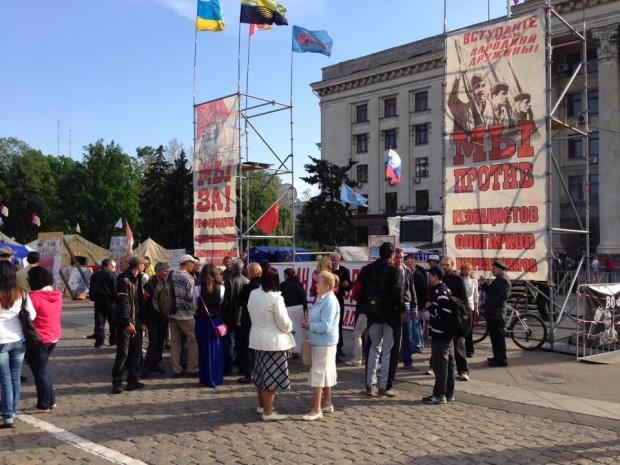
Photo by Maksim Motin, Odessa, 1 May 2014. Signs: (L) We are For Referendum Federalization Customs Union
(R) Join the ranks of the People’s Volunteer Corps!
We Oppose Neo-Fascists Oligarchs Corrupt People
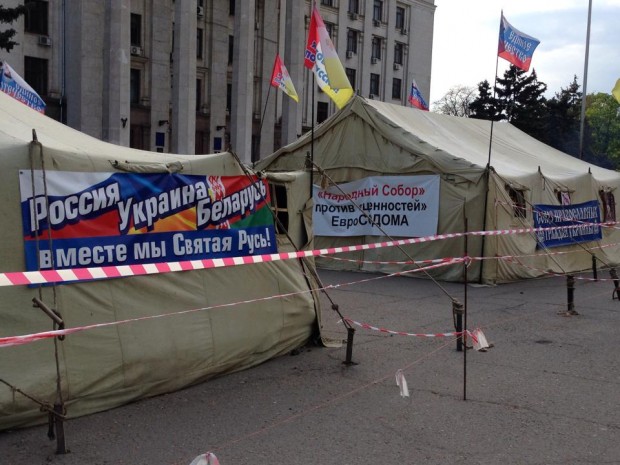
Tents in Odessa 1 May 2014. Photo by Max Motin. Signs: (L) Russia, Ukraine, Belarus Together We Are Sacred Rus’
(C) Popular Assembly Against the “Values” of EuroSodom
(R) Union of Orthodox Citizens of Ukraine
3. The media is writing that they put up barricades. A lie. Look at the photographs, they are 1-3 hours old. After the Odessians organized themselves, they chased the provocateurs into the Afina (Athens) shopping mall (some of them broke away and hid in the Trade Unions Building). Everything was headed to settling scores with them inside. But the police closed the entrance and exit (I think thus saving the provocateurs). Later, the spetsnaz arrived, went into the building, grabbed the provocateurs and loaded htem into a police van. Now there are no barricades in the city.
4. It was apparently the fate of the Trade Unions Building to burn. After the Odessians repelled the attack. They went on the offensive themselves. They burned all the tents on Kulikovo Field (there were 4-5 tents), beat the people living in them (alas, there were only a few people there, and those who are sincerely for federalization and they are locals). Now the Trade Unions Building is burning.
5. The most terrible. There are victims again. They say 3-6 have died (that was before the fire from the side of the EuroMaidan supporters. As a result of the fire, there are more than 30 from the other side). This is horrible. Odessa is a peaceful city. After the first part of the events today, the entire square was shouting “Putin is a Dick” and “Odessa is with Ukraine.”
After the fire, everyone is in shock. It is a terrible tragedy. For everyone.”
0634 GMT: The account @SurkovRussia — spelled in Russian with an old-fashioned hard sign on the end — is widely believed to be the real Vladislav Surkov’s account, although it is not verified and journalists continue to question whether it is real. It has 69,000 followers and sounds like Surkov, and so it has become a media factor in its own right. Not surprisingly, @SurkovRussia was outraged by the Odessa events:
Почему молчат @navalny, @borisakunin, @BorisNemtsov, @xenia_sobchak?
Где правозащитнички с Алексеевой?
Спокойно спят в своих кроватках?
— Сурковъ (@SurkovRussia) May 2, 2014
Translation: @SurkovRussia Why are @navalny, @borisakunin, @BorisNemtsov, @xenia_sobchak silent? Where is the human rights activists with [Ludmila] Alexeyeva? Are they sleeping soundly in their beds?
Yesterday as @UN Security Council was discussing "bad" pro-Russian activists, "good" Ukrainian activists have burned 38 people alive…
— Сурковъ (@SurkovRussia) May 3, 2014
Глянул Твиттер OOH. Ни слова о бойне в Одессе.
Грязные лицемеры.
Checked @UN Twitter. Not a word about Odessa massacre.
Dirty hypocrites.
— Сурковъ (@SurkovRussia) May 3, 2014
Даже если Киев создаст концлагеря и будет сжигать всех "неукраинцев", США и ООН его поддержат… С учётом этого факта и следует действовать.
— Сурковъ (@SurkovRussia) May 3, 2014
Translation: @SurkovRussia Even if Kiev creates concentration camps and burns all the “non-Ukrainians,” the USA and UN will support it…With consideration of that fact we must then take action.
Депутат Рады Ирина Фарион: "Браво, Одесса. Пусть горят черти в пекле…"
Ирина, очень скоро вы тоже там будете.
https://t.co/19nZLHoHQK
— Сурковъ (@SurkovRussia) May 3, 2014
Translation: Deputy of the Rada Irina Farion: “Bravo, Odessa. Let the devils burn in the oven….” Irina, you’ll be there yourself very soon.”
Поэт Вадим Негатуров умер ночью от ожогов, полученных в родном городе.
Будь проклята страна, сжигающая своих поэтов. pic.twitter.com/axm9sKNHBY
— Сурковъ (@SurkovRussia) May 3, 2014
Translation: Poet Vadim Negaturov died tonight from burns received in his native town. Cursed be that country burning its poets.
0630 GMT: The Russian Foreign Ministry expressed its outrage Friday “On the Tragic Events in Odessa”:
“The tragic events in Odessa 2 May, as a result of which, judging from available information, 38 people died and 50 people were injured, is perceived in Moscow as yet another manifestion of the criminal irresponsiiblity of the Kiev authorities, abetting the insolent national-radicals, including Right Sector, which is waging a campaign of physical terror against the advocates of federalization and real Constitutional changes in Ukrainian society.
We categorically condemn this.
Together with the ongoing punitive operation of the current Kiev government in Slavyansk, the tragedy in Odessa became yet another confirmation of the criminal reliance on force and intimidation, which has nothing in common with the obligations ensuing from the agreement of 21 February of this year and the Geneva statement of 17 April.
The information about the new crime in Odessa was perceived with outrage in Russia, and Kiev and its Western backers are urged to put an end to this violent lawlessness, and to show accountability to the Ukrainian people.”
May 2, 2014
1630 GMT: OVD-Info, the Russian citizens’ police abuse monitoring team, has a report on the three LGBT activists arrested yesterday after Russian Orthodox provocateurs assaulted their May Day parade:
“After the end of the ‘March of Leftists Forces’ on Samotechnaya Street, three participants of the LGBT column were detained and are now in the Meshchanskoye police department. Among them are Dmitry Svetly, leader of the Rainbow Coalition. After his detention, also detained were Reida Lin and Niks Nemeni, who had tried to learn from police officers why Svetly was being detained. All three have been charged by the Meshchanskoy department with Art. 19-3 of the Russia Code of Administrative Violations (up to 15 days arrest).
As one of the participants in the LGBT column told OVD-Info, during the march, various provocations were made against them including by activists from the Bozhya Volya [God’s will] group who threw eggs, paint and home-made explosives at their column, and also hit activists in the head, sprayed pepper spray at them and tore their symbols from them. Activists of Bozhya Volya were arrested by police, and Rainbow Association participants plan to file a complaint against them at the police.
Update: All three were released from the police department. Dmitry Svetly is charged under Art. 20-2 (fine up to 30,000 rubles), Lin and Nemeni charged with Art. 19-3.”
1536 GMT: While tens of thousands were allowed to march in Moscow — including some with racist and extremist slogans (see our stories below) — when an LGBT contingent tried to participate, Russian Orthodox activists repeatedly assaulted them. Authorities then seemed to use a “catch and release” program for Russian Orthodox provocateurs who repeatedly attacked the gay marchers, three of whom were then arrested. Here a Russian Orthodox activist known to protesters from past events (in black) strikes a gay marcher:
A photojournalist Andrei Nasonov who was on the scene posted a report at the SQueer group on VKontakte. Activists from LGBT groups, feminists, greens, anarchists, the Committee for Workers’ International, the Leftist Socialist Action and the Russian Socialist Movement gathered at a metro stop to take part in the May Day demonstrations. Trouble began as soon as some people exited the metro and saw Russian Orthodox activists familiar to them from other attacks on their events, waiting for them to cause trouble. They saw several nationalists running and shouting “Russians, Forward!” and raising their arms in a Nazi-like salute. Here’s an excerpted translation from The Interpreter:
“Before the beginning of the procession, there was a small hold-up: the police demanded that we fold up the rainbow flags, since they ‘threatened the safety of participations,’ however the LGBT column with the support of the rest refused to remove the rainbow. After a police warning, people began moving.
Ten minutes later, the first provocateur appeared alongside the rainbow column, already well-known from past LGBT events: a short, bearded Russian Orthodox activist. Cutting directly across the column with the rainbow flags, he struck one of the participants in the action several times in the face. The homophobe was then detained and pushed to the side, however, he lunged at a policeman, punching him with full force in the face. Several OMON [riot police] piled on him and then dragged him off to a police van.
Then the attacks continued. About every 3-5 minutes, shouts rang out — “Provocateurs!” — and journalists and OMON would rush to the site of a fist-fight. They kept coming up to the Rainbow Association column. One of the homophobes sprayed pepper spray. Most of the provocateurs were immediately put in the van. But someone confided to me that all these attacks were planned from the outset and the police knew about it, otherwise, not a single homophobe could have reached the location of the action; at first they got past the metal-detectors, and then they were surrounded by police, OMON and agents from E Center [Extremism Center of the FSB].
There were about a dozen attacks. Several Russian Orthodox activists were detained, among them a girl who was barely restrained by two OMON. I will note that the police nonetheless let go several of the Russian Orthodox. As a rule, those who were holding icons in their hands were lucky. Several LGBT activists were detained, including Dmitry Yartsev, Reida Lin, and Niks Nemeni and taken to the Meshchanskoye police department.”
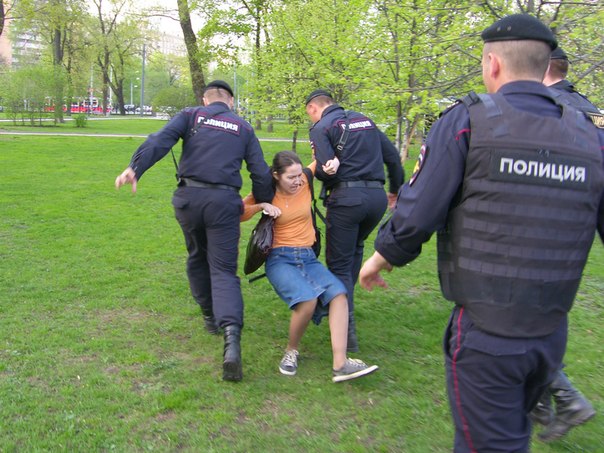
Police detain a Russian Orthodox activist who screamed at gay demonstrators. Photo by Andrei Nasonov
While the Russian opposition has been split by the Crimea issue — this protester’s sign appears to be ironic, as it shows police and Russian Orthodox protesters threatening LGBT:
For more from Nasonov’s photo album from the LGBT march, visit VKontakte.
1434 GMT: The large march on Red Square in Moscow for May Day yesterday tended to drown out both some good and bad news from other locations. In St. Petersburg, an anti-war procession was given a permit by local authorities and there were no arrests reported:
Sergei Polutorny uploaded a video a series of short clips of the anti-war and pro-Ukrainian march of about 1,000 people from a variety of political groups including the Democratic Union , some carrying European Union flags, some a large banner saying “Putin is the Last Refuge of Scoundrels” and “Democracy for Russia and Ukraine!” The LGBT movement in St. Petersburg also participated.
1404 GMT: Yesterdays’s officially-sponsored May Day parade in Moscow with 100,000 people reportedly participating was a patriotic extravanza, signs extolling Putin, patriotic cheers for the forcible annexation of Crimea, and a Russian Black Sea Fleet admiral on the loud-speaker, among other speakers welcoming Simferopol and Sevastopol into the Russian Federation fold.
Miriam Elder at BuzzFeed sums up it in Putin Lovers, Obama Haters, And Everyone In Between Celebrated May Day In Moscow. Among the marchers were the sort of xenophobic and extremist sentiments that now routinely appear even at officially-sponsored events or legal opposition rallies, as Russian blogger Rustem Adagamov reported:
Первомай в Москве pic.twitter.com/BRHiyYRVVN
— Рустем Адагамов (@adagamov) May 1, 2014
Translation: @adagamov May 1st in Moscow
Sign: Collapse of Darwin’s Theory Big-Eared Black Monkey Tries to Rule World!
Вот это тоже красиво (фото: Евг.Фельдман/Новая) pic.twitter.com/FLZHmDjxj9
— Рустем Адагамов (@adagamov) May 1, 2014
Translation: This here is pretty, too (photo: Evgeny Feldman/Novaya Gazeta).
Indeed, this has to be among the most bizarre causes — a young couple from the Communist Party of Russian Federation (KPRF), the male wearing a t-shirt with an English-language advertisement carrying a photo of Stalin’s henchman Lavrenty Beria.
The Kremlin is promoting the idea of ordinary Russians taking vacations in Crimea — following up on the other “tourists” in camouflage who began arriving in large numbers in late February.
Они едут отдыхать в Крым (фото: http://t.co/j12aqytfbD) pic.twitter.com/a9ePyH8HqI
— Рустем Адагамов (@adagamov) May 1, 2014
Translation: @adagmaov They are going to vacation in Crimea.
The Putin cult of personality was the theme at a May Day march in Simferopol as well, reports Adagamov:
Первомай в Симферополе pic.twitter.com/F5c9DjHfNT
— Рустем Адагамов (@adagamov) May 1, 2014
Translation: May 1st in Simferopol.
May 1, 2014
1857 GMT: TechCrunch and Ars Technica report that Elon Musk, the prominent electric car manufacturer, has won a lawsuit against his competitor, United Launch Alliance, over purchases from Russia:
“After announcing last week that it would be filing suit against the U.S. Air Force over the government agency’s decision to award a contract for national defense-related rocket launches exclusively to the United Launch Alliance (ULA), a joint-venture between aeronautics industry leaders Boeing and Lockheed-Martin, without entertaining competitive bids. Last night, SpaceX won a small but significant victory (via Ars Technica) in its efforts to fight the sole-sourcing of defense space work, by winning an injunction against the ULA regarding its purchase of Russian rockets.”
SpaceX argued that NPO Energomash was “wholly owned and operated by the Russian government” and therefore “its rockets are in violation of America’s recently imposed sanctions against Russia”.
The first claim technically isn’t true, as NPO Energomash, while largely owned by the Russian government, has another investor which is a public joint-stock company, RSC Energia (S.P. Korolev Rocket and Space Corporation Energia) with 13.98% of the total shares. But since RSC Energia’s largest “investors are first and foremost the state” (38%), it’s a technicality. Its other owner, Ravitiye is a wholly-owned subsidiary that bought back its own stock from foreign investors. These companies have their roots deep in the Soviet space program and have always benefited from substantial state support — they aren’t garage start-ups.
But its other claim isn’t true, either; neither NPO Energomash or its board members or investors are in the sanctions list. The US government has not barred all business with Russia; the sanctions list originally issued and additions made recently specify that individuals rather than companies are sanctioned.
Even so, the purchase of the Russian rockets, given deteriorating relations even before the annexation of the Crimea, were already controversial and there were already calls to end the program, which saved the US money but at a political and moral cost.
Суд в США запретил United Launch Alliance покупать российские ракетные двигатели.
С легкой руки SpaceX
— mojahead (@mojahead) May 1, 2014
Translation: @mojahead A court in the USA banned United Launch Alliance from buying Russian rocket engines. With the light hand of SpaceX.
1834 GMT: For the first time since the fall of the USSR in 1991, the May Day parade has come back to Red Square. (See Soviet-Style May Day Celebrations Making a Comeback under Putin by Paul Goble). Stalin had to resort to invoking Russian Orthodox faith as a means to consolidate the masses in World War II; Putin, a very public devout Orthodox Christian isn’t ashamed to invoke an old Communist holiday for the toilers.
As RBK reports, the hour-long parade was broadcast live on state TV, and official slogans and music for the holiday were unabashedly celebratory of the recent forcible annexation of the Crimea with banners saying “Vacation in Crimea,” “Hurrah, Crimea is Once Again Home.” They also fueled the cult of personality with banners like “We Believe in Putin” and Putin is Right”. While Putin and his close aides did not appear top Lenin’s Tomb as in Brezhnev’s day, that may only be due to the fact that it is under repair.
Meanwhile, Moscow Mayor Anatoly Sobyanin unmistakeably used the occasion — and the city’s resources — to advertise his own party’s election campaign for the Moscow municipal elections, said RBK.
The primaries were launched last month with the slogan “My Moscow” and activists (mainly in trade unions) are holding preliminary elections for candidates for United Russia, which can then be nominated by the party and not have to collect signatures from existing deputies under the current system.
“According to sources close to the mayor’s office, the coalition of pro-government candidates also may get the name ‘My Moscow.’ This project was subtly advertised at the May First demonstration. Red Square was hung with large colorful banners with the slogan ‘My Moscow.’ Trade union activists then carried posters saying ‘My Moscow City of Sports and Health’ and ‘My Moscow – Kindergartens for Children’and ‘We Elected Our Mayor, Let’s Elect Our Deputies.'”
On the loudspeaker was the song “Best City on Earth” and in “the voice of Soviet TV narrators,” as RBK characterized it, the announcer kept repeating the phrase “my Moscow” and also urging people to vacation in the Crimea.
While the May Day theme may be associated with workers worldwide, in Russia, it’s the past work record and pension that is on many people’s minds — and Putin knows that. Out of a population of 143.5 million, 40 million or 28% of the people are pensioners (by contrast, in the US, with a population of 313.9 million, 12% of the population are receiving Social Security retirement benefits.)
1806 GMT: May Day was also a signal that not just communists but National Socialists — ultranationalists — could come out of the woodwork:
One more time: yes, this National Socialist march took place today, legally, in St Petersburg. @svaboda pic.twitter.com/c7Ipjweg1O
— Anne Applebaum (@anneapplebaum) May 1, 2014
0606 GMT: Russian Railways, the state monopoly, had a shocking loss of profits in 2013, but appears unfazed, secure in its position in Putin’s pantheon of oligarchs’ companies.
On 30 April, the Russian-language Reuters reported that profits for Russian Railways had sunk by a startling 61% for 2013.
“The net profit of the Russian railroad monopoly Russian Railways dropped by international standards in 2013 by 61% to 36.7 billion rubles ($10.3 million), the state company announced Wednesday [30 April], explaining the fall due to “the unfavorable economic situation.”
RR said it had made cost cuts but they were insufficient. The Olympics investment was only mentioned in passing as part of a 566 billion ruble ($15.8 billion) expenditure on development, without any breakdown. To account for its losses, RR didn’t mention the facts brought to light by opposition activists Alexey Navalny and Boris Nemtsov, who said they could not expect to make anything back on their Sochi investments. Instead, RR said it had written off losses due to amortization and higher taxes.
Even so, RR reported a growth by 14.4% after purchasing 75% of a European logistics operator, Gefco, for 800 million euro.
Vladimir Yakunin, head of Russian Railways, was one of the key oligarchs to invest in Putin’s extravagant Sochi Olympics construction — and opposition bloggers said that ticket prices were raised to cover the outrageous costs. Yakunin was included in the US list of sanctions of Russian officials in retaliation for Putin’s forcible annexation of the Crimea. (See also “A Feast in the Time of Plague: While Yakunin is on US Sanctions List, His Faimly is Living Large” by Elena Servettaz).
0526 GMT: Alexey Navalny’s Anti-Corruption Fund announced new research this week claiming that Russia Railways President Vladimir Yakunin, one of the 25 most highly-compensated managers in Russia and his family personally receive the profits from a mandatory service fees on each mobile phone ticket sale, Forbes Russia reported. The ticket information indicates that mobile sales are handled by a company called UFS, Ltd., an “official agent” of Russian Railways. The Anti-Corruption Fund (AFC) published documents supporting their claims on a separate website and on Navalny’s blog.
AFC researchers were able to track UFS, Ltd. to ownership by a Cyprus off-shore company AM Ebookers which in turn is owned by another company, Verlys Nominees, Ltd. founded by a citizen of Cyprus whom is suspected by Navalny of being part of Yakunin’s “gigantic business empire.” The director of AM Ebookers is Alastair Matthew Cunhningham, named by the International Consortium of Investigative Journalists as a person who stands in for real owners who want to hide their identities; he is listed as the director of 1,039 companies. Navalny’s Fund believes that UFS has earned almost 50 million rubles ($1.4 million) in mobile app sales and as much as 3.1 billion rubles ($87 million) from its cut in ticket sales. Navalny has appealed to the Russian prosecutor to investigate the allegations of corruption.
The new research has enabled the ACF to fill in more squares on its already impressive diagram of Yakunin’s empire.
0406 GMT: “The Train’s Completely Gone” is a multi-media article in Novaya Gazeta by Yelena Racheva with photography by Dmitry Vaskulin about how villagers in Pskov Region have been completely cut off from the rest of the world when their commuter trains were cancelled.
Russian Railways, managed by Vladimir Yakunin, an oligarch close to Putin, cut 150 routes of suburban trains due to inability of subsidiary companies to pay their debts to regional governments.
Racheva follows the route of a postal worker in a village called Dolzhitsy as she struggles to get through her route by train and walks through the mud and snowdrifts. One of the most galling things for the local people is that before the route cancellations, if they got up at 5:00 a.m. they could go into a town and go to market, and be back in time for the evening news. Now there is no train for them at all, but a brand-new service train carrying maintenance and line workers whizzes past them, not stopping. Only those with railroad passes are allowed to board. This is especially worrisome when people cannot even get on a train for a medical emergency — the conductors won’t stop because they are heavily fined for taking unauthorized passengers.
Ludmila Matveyeva, a local resident became a transportation activist on behalf of her village, calling the governor’s office and rail officials constantly to try to get action, even using a special occasion when hot-lines were opened to get through. One of Turchak’s political opponents, Oleg Bryachak, saw an opportunity and came to film the muddy villages without train access, and then found Matveyeva and her neighbors a van to pick them up once a week and taken them to town.
A video with the photo essay shows the townspeople desperately bargaining with a train driver who refuses to take them on board, threatening to block the tracks, then finally giving up, and trudging along the muddy paths back to their homes, where only state television with sports programs provide a break in their dull routine and a window to the outside world.
One man expresses a wish for a least some road for fire trucks and ambulances to reach them, but another villager explains that officials have told her that building such a road would take three years, and that restoring the rail service is more realistic. Interestingly, even some of the elderly people in this remote area do have cell phones.
Novaya Gazeta follows Matveyeva and her friends and a local newspaper correspondent to an official war memorial rally where some of the soldiers are carrying red flags with hammer and sickles, where they go in search of the governor, who is expected, but are turned away. They end up standing in a picket line with a sign, “Turchak, Bring Back the Train!” In the end, the governor finally appears and claims to have spoken to Yakunin personally about their issues, but doesn’t give any specific pledges. The townspeople try to convey him the difficulties of their poor roads and lack of transport, and he waves them away. They return dejected to their homes to drink vodka.
April 30, 2014
2026 GMT: The US State Department’s Country Reports on Terrorism were released today, and the Russian chapter appears to have been drafted in the days of the reset; there is no criticism of lack of Russian cooperation on the Boston bombing:
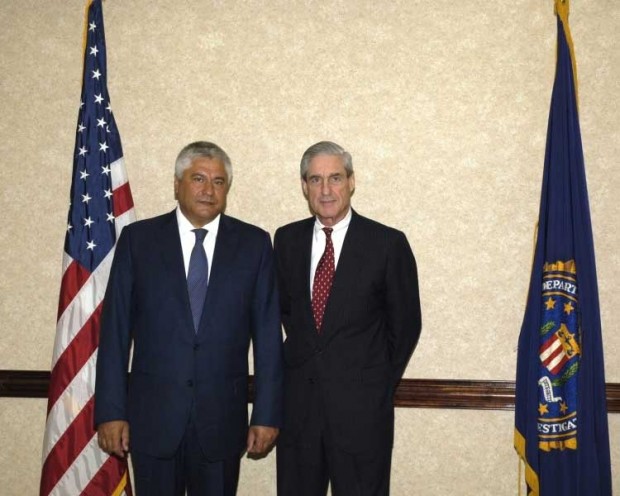
Former FBI Director Robert Mueller (right) with Russian Minister of Internal Affairs Vladimir Kolokoltsev, Washington DC, 23 May 2013. Photo by Russian Foreign Ministry
“Russia was willing to work bilaterally with the United States and other governments within multilateral organizations on specific counterterrorism issues, but significant challenges remain. The Boston Marathon bombing led to an uptick in U.S. and Russia counterterrorism cooperation.
A number of terrorist attacks continued to be committed in the volatile North Caucasus region of Russia. Separatism, inter-ethnic rivalry, revenge, banditry, and violent extremist Islamist ideology were the primary motivating factors for terrorism-related violence. Occasionally, violence originating in the North Caucasus spilled into other areas of Russia, as seen most notably in October and December with the suicide bombings in Volgograd, a large city in southeastern Russia. Terrorists not directly related to events in the Caucasus also carried out attacks in 2013, including an unsuccessful rocket attack by separatists in Tatarstan on a Russian petrochemical plant. On December 20, President Putin reported that in 2013, Russian security services prevented 12 terrorist acts in Russia, killed 255 terrorists, and arrested 500 terrorists and their supporters.
The level of cooperation and bilateral operations between the Governments of Russia and the United States showed some improvements in 2013. Specifically, relations between the Russian Federal Security Services (FSB) and the U.S. Federal Bureau of Investigation saw an increase in both frequency and substance of information exchanges. After the Boston Marathon bombing, the FSB provided information aiding the FBI’s investigation and approved and facilitated the travel of FBI investigators to Dagestan to conduct follow-up interviews related to the Boston investigation. Russia also continued to cooperate in a yearly conference with the U.S. intelligence community. Additionally, some operational and intelligence information connected to terrorism-related threats was shared among the agencies on a regular basis, with senior leaders meeting in Moscow and in Washington.”
The report does not contain recent information covered by the New York Times from the Inspector General’s report about Russia’s failure to supply crucial information about the suspects in the Boston bombing.
“The new inspector general’s report found that it was only after the bombing occurred last April that the Russians shared with the F.B.I. the additional intelligence, including information from a telephone conversation the Russian authorities had intercepted between Mr. Tsarnaev and his mother in which they discussed Islamic jihad.”
This admission only came long after challenges by journalist Amy Knight in The New York Review of Books in June 2013:
“[…] Russian authorities would have followed Tamerlan’s every move during his trip [to Russia], especially since he spent much of his visit in Dagestan and Chechnya, both considered breeding grounds of Islamic radicalism. It is a well-known fact that the Russian FSB (successor to the KGB) has infiltrated all the major rebel groups in these two territories. If, as numerous reports have claimed, Tamerlan was regularly meeting with Islamic rebels in 2012, the FSB would have been aware of it. Russian authorities also would have known that he then returned to the US. Yet the Americans were told nothing about Tamerlan’s trip, or his meetings with radicals.
Instead of raising questions about Russia’s file on Tamerlan, US officials have gone out of their way since the bombings to thank Moscow for its help in fighting terrorism and welcome Russian security officials in Washington. All this has played into the Kremlin’s hands and helped reinforce its longstanding arguments that the Chechen rebels it has been fighting in a brutal counter-insurgency for years are part of a larger al-Qaeda-led group that has the goal of international jihad.”
There report also does not seem to put in context or question in any way the extraordinary information that Russia “killed 255 terrorists, and arrested 500 terrorists and their supporters” — figures that don’t include the thousands of short-term detentions of suspects, many of which are not even recorded. (In the first quarter of 2014 alone, Russian anti-terrorist forces have killed 78 suspected terrorists). Russia, placed in the “Europe” section of the terrorism report, has by far the largest number of “terrorists killed” in unexplained circumstances — a figure that dwarfs even many other areas around the world in Africa and Asia prone to terrorism and known for brutal state counter-insurgency tactics. In the section on Turkey, for example, 200 suspects were detained, none were killed, although Turkey suffered 20 terrorist attacks, including one in the Reyhanli bombing near the border with Syria in which 52 lost their lives. In just the series of bombings in Volgograd in Russia before the Sochi Olympics, a total of 41 were killed.
“The 2014 Sochi Olympics took place in proximity to the North Caucasus, where ongoing violence and extremist activity created a heightened concern over potential terrorist activity targeting the Games. In July 2013, Doku Umarov, leader of the Caucasus Emirate, called for attacks on the Olympic Games. In response, the Russian security services stated publicly that they would implement necessary security measures to ensure the safety of the Games. The security services have also held a series of working group meetings with foreign law enforcement and intelligence agencies, and with security representatives from Olympic sponsors and National Olympic Committees.”
The Caucasus Emirate is not included in the list of Foreign Terrorist Organizations maintained by the US, although at one time, eager to be cooperative with Moscow, the US included Umarov as an individual in its designation under Presidential Directive 13244 targeting terrorists and announced a $5 million reward under its Rewards for Justice program for information leading to Umarov’s capture — a move that the Russian state media treated as tantamount to being on the US FTO wanted list. Umarov was killed last year by Russian forces, but his organization is not in the FTO list and there is not yet any designation for his successor Ali Abu Muhammed (Kebekov).
1836 GMT: A video titled “Orthodox Fascism in Russia” posted last week by an anonymous pro-Ukrainian blogger among others has been widely circulated on Russian and Ukrainian social media and news sites. With thumping rock music and scary footage of saluting marchers, the video takes its name from a comment made by an activist at an ultranationalist rally, “Orthodox fascism will save Russia.” The video contains alarming scenes seeming to indicate support for ultranationalist extremists by at least some Russian Orthodox clergy.
The video also provides proof of the fascistic nature of various ultranationalist movements within Russia — which are backing pro-Russian separatists in Ukraine. It features footage from the Russian March, an annual procession that has increased in number and which opposition leader Alexey Navalny has supported, although last year he did not take part in it as in previous years. From the old nationalist slogan “Beat the Jews, Save Russia!” to insignia that look like swastikas, the video makes a compelling statement about the upsurge in fascistic movements in Russia.
What we don’t get from the sinister video is any sense of the size of the movements, the degree to which the broader public supports them, and the sources of their funding. Last year, the Russian March, staged 4 November for Unity Day, a holiday introduced by Putin to commemorate the expulsion of Poles from Moscow in 1612, attracted about 8,000 people — more than the few thousand who showed up every year since 2005 (see The Interpreter‘s translation of Russian media coverage.) That’s not so many — a march to protest the forcible annexation of the Crimea drew some 50,000 with only a few thousand in a counter-rally organized by Russian Orthodox activists; a rally against suppression of media freedom drew 10,000.
What we also can’t tell is how much these groups and their events enjoy official support — they are given parade or rally permits, and some of them are related to national movements sponsored by the Kremlin, but the extent to which they are avidly sustained — as distinct from tolerated or manipulated for political purposes — is not clear. At the end of “Orthodox Fascism,” one speaker says that when he confronted an extreme Russian Orthodox priest about a violent attack, he was told that he could “do nothing” because the group “had the backing of Vladimir Putin.”
The provenance of the film circulating now appears to be in part a film titled “Russian March 2012: Orthodoxy, Fascism, Paganism,” produced and uploaded in 2012 by Portal-Credo.ru, a Russian news and research site run by advocates of religious freedom who are critical of the increasing interference of the Russian Orthodox Church in civil society. The older video contains some of the same scenes and slogans as the video currently circulated — juxtaposed with scenes from Hitler’s orations. The videos show similar concerns but appear to have different producers, and the newer video is more stark, even without the Hitler montage.
As Ekho Moskvy explained in October 2013 in an article titled “Are ‘Orthodox Fascists’ Needed for the 700th Anniversary of Radonezhsky?”, this earlier film was made by Mikhail Baranov, a former monk and founder of Credo. The saying “Orthodox fascism is the salvation of Russia” is quoted from Pavel Turukhin, one of the organizers of a march he interviewed — also featured in this month’s film by other producers — at the Troitsa-Sergiev Monastery in Sergiev Posad where the anniversary of St. Sergei Radonezhsky took place. This video also showed the Russian March, which for the first time in November 2012 was allowed in the center of Moscow; previously it had been permitted only in Lyublino on the outskirts of town.
According to an Interfax report in 2010, a publication of this group staging the Radonezhsky anniversary event, Vestnik Voinov Khristovskikh [Herald of Christ’s Warriors] was pronounced by the office of the Russian prosecutor’s Center of Information Analysis Technologies as containing “indications of the propaganda of fascism, specifically Russian Orthodox fascism”. With such official backing, the phrase caught on, yet some believers took great umbrage over the term, denying that there was any such phenomenon, and condemning the term as offensive in itself.
All in all, “Orthodox Fascism” is doing a lot to spread alarm about the turning of the Russian nationalist tide to further extremism and support for violence in Ukraine, and it will be interesting to see if either the Russian Orthodox Church’s leadership or the Kremlin repudiate it in any way.
1412 GMT: The rise of armed Russian-backed “self-defense” groups with extremist ideology taking over buildings in eastern Ukraine, notably “the Donetsk People’s Republic” has drawn attention to the extremist groups within Russia who have sustained their counterparts with ideological as well as material help. How strong are the fascists in Russia itself?
Russian observers argue constantly over whether the Putin regime is turning fascist, and by the classic signs of state fascism, they may never fully make this determination. While that debate must continue, it’s important to see that groups whose marginalized ideologies were once displaced by formal authoritarian state education and law-enforcement are now able to rise, given the erosion of state barriers in Putin’s self-induced political and economic crisis.
The reality is that under Putin, with his direct connivance, and orchestration by his aide Vladislav Surkov and others, fascistic youth groups have been funded and encouraged and extremist thinkers like Aleksandr Dugin have been given a greater hearing and gained a wider audience. The Kremlin-funded youth group Nashi (dubbed “Nashisty” by liberals to convey its Nazi-like coloration by extremists) may be on the wane but the rise of other nationalist youth groups, the state-funded Cossacks movement, the continued presence of extremist flags and slogans at Russian March, as well as increasing tolerance for formerly disparaged concepts (i.e. “the good Hitler“) mean we should all worry about Russia’s direction.
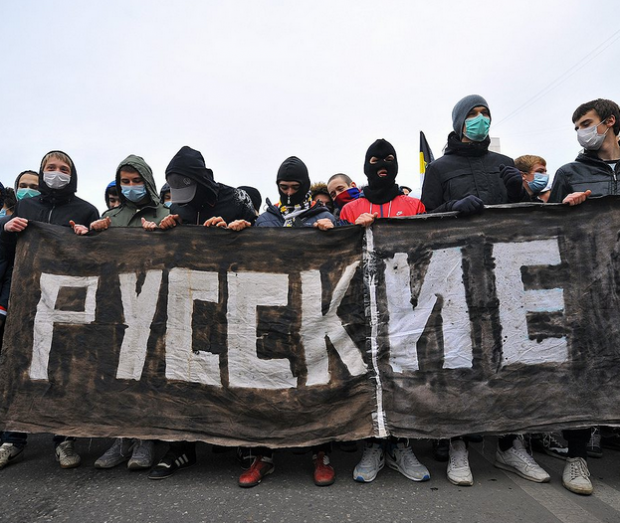
Before there were masked Russian-backed separatists in eastern Ukraine, there were masked Russian extremists marching in Moscow. Denis Lebedev / Kommersant. November 2013.
The Ukrainian blogger Anton Shekhovtsov is among the best chroniclers of the neo-Nazi movements in Russia and the Eurasian region and their connection to ultra-right groups in Western Europe. In a recent post, he documents the close relationship between fascists in Russia, who gain inspiration from some European extremists, and the pro-Russian separatists in south and eastern Ukraine. Far from being a recent spontaneous people’s uprising, the self-proclaimed “Donetsk People’s Republic” has roots in some of these Russia-based extremist movements:
“Here are some pictures taken in the Donetsk region prior to the Euromaidan protests, which – in addition to other evidence – prove that Russian fascist organisations have been heavily infiltrating and instigating pro-Russian separatist movements in South-Eastern Ukraine for quite some time already.”
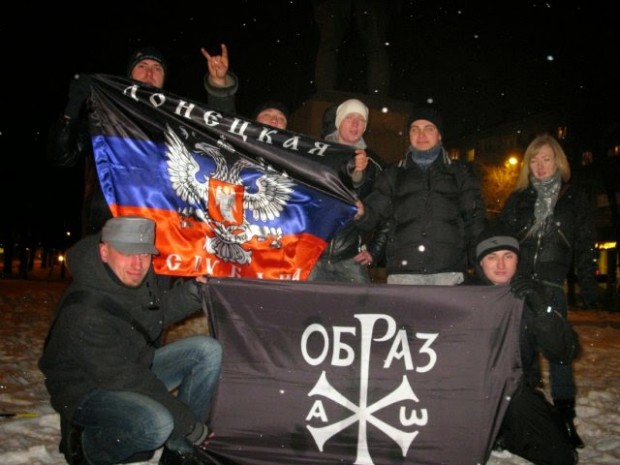
Photo taken in Donetsk in February 2012 shows flag of extremist Russkiy Obraz group whose members were charged with 2009 murders of lawyer Stanislav Markelov and journalist Anastasia Baburova. Via Anton Shekhovtsov.
1310 GMT: Russkiy Obraz [Russian Image], an neo-Nazi group, is said now to be defunct, although its influence persists online and it is now being tied to the roots of pro-Russian separatism in Ukraine. Its members were arrested for a series of murders of Russian civic figures over the last five years. Ilya Goryachev, its founder and ideologue recently extradited to Russia to await trial, was based in Serbia and connected to certain Serbian officials and the Russian ambassador to Serbia, as Lily Lynch at the Balkanist has detailed.
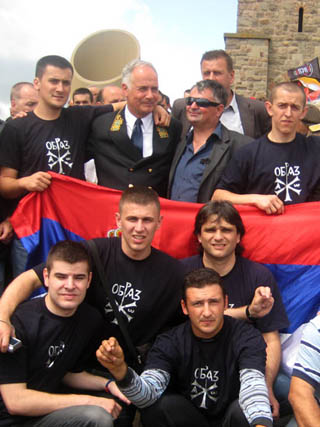
Former Russian ambassador to Serbia, Aleksandr Konuzin with members of Serbian Obraz in June 2010. Photo by e-novine.
Goryachev, a history student, had originally come to Serbia attracted to anti-NATO opposition in the Balkans war, and was introduced to Serbian nationalist-clerical groups; ultimately he went on to form a similar network of groups in 20 Russian regions and Belarus. How could this happen, in a country with World War II memorials and veteran survivors in every town? Lynch provides a plausible explanation — the Kremlin manipulated the movements to savage their liberal enemies:
“Surkov created fake opposition parties, fake youth movements, and fake ultra-nationalist groups. He backed modern art projects, civic forums for NGOs, and contemporary literature festivals, as well as skinhead and Christian fundamentalist groups. The point was to control political opponents by controlling all political discourse, from neo-Nazism to pro-Western liberalism, Orthodox fundamentalism to the urban elitism of the Moscow art scene.
What he could not co-opt and control, he would attack — using one of the many Kremlin-friendly groups at his disposal. The Putin regime believed the biggest threat to its existence was a pro-democracy “colored” revolution, like the Orange Revolution that had swept across Ukraine in 2004. So the Kremlin set about launching what Russia expert Robert Horvath called a “preventative counter-revolution” against the democratic “orangists”. This was one of the utilities of managed nationalism. Neo-nazis were given free rein to terrorize the opposition. Ultra-nationalist youth were instructed by Kremlin officials to make opposition youth too afraid to attend rallies. And one of the groups most important to the counter-revolutionary campaign was Russky Obraz, led by Ilya Goryachev.”
Goryachev went on to his first murder of an opponent — Fyodor Filatov, a leader of an anti-fascist skinhead movement. Ultimately there were more than a dozen killed in a spree involving a group that some people thought existed only on the Internet, BORN, whose initials stand for the Russian words for “Battle Organization of Russian Nationalists.” Among their victims were human rights lawyers Stanislav Markelov, who defended the family of a Chechen girl raped and murdered by a Russian general, and Anastasiya Baburova, a liberal journalist. Even behind bars, he continued to enjoy the support of friends in high places and top defense attorneys; there are many odd aspects to his story as Lynch describes, and an intriguing connection to Surkov:
“The circumstances surrounding Goryachev’s May 8th arrest were very weird. First, he was apprehended at Belgrade’s Nikola Tesla airport, even though his lawyers claim he had no plane ticket or plans to fly anywhere. Second, Vladislav Surkov resigned from Russian politics the same day, meaning Putin fired him.
In one of his letters from Belgrade’s central prison, Goryachev confirmed that Surkov’s team had been tasked with monitoring and coordinating the activities of extremist groups, including Russky Obraz. This would make Surkov the organization’s most powerful contact inside the Kremlin. Goryachev speculated that his arrest was part of a larger mission to unearth incriminating information about former officials who, under Surkov’s direction, had worked closely with extremist groups. By linking Surkov and others in his orbit with the BORN murderers, Putin would be able to discredit a powerful and politically unreliable opponent (some say Surkov, who had previously been a staunch Putin supporter, was fired for expressing sympathy with anti-Putin protesters). Eliminating Surkov’s camp would allow Putin to further consolidate power.”
Goryachev was extradited to Moscow in November 2013 and is awaiting trial. While Surkov was out of favor and even under investigation for a time, he is now back as a presidential aide, busy attacking Putin’s rivals, and was included in the US sanctions list for his instrumental role in aggression against Ukraine.
April 29, 2014
1753 GMT: So that trip to Moscow by the delegation from Bahrain paid off:
Arms, the great equalizer: #Bahrain signs deal with Russian defence export agency & #Syria supplier Rosoboronexport http://t.co/xvLM3XKC17
— John Horne (@JohnHorneUK) April 29, 2014
Bahrain has a terrible human rights record, rightly criticized, and has barred the UN’s special rapporteur on torture from entry. The US government’s “shameful policy” of silence or timidity on pushing for democracy in Bahrain due to geopolitical concerns has been condemned. Bahrain is happy to do business with the Kremlin, which will never give the monarchy even the mild rebuke Washington musters. The question is whether critics of Bahrain will now add to their menu the fact it’s not just Washington but Moscow backing this regime.
1753 GMT: Kommersant ran a story today about how State Duma member Sergei Mironov, chair of Just Russia would like to get rid of Ilya Ponomarev, a former Just Russia member who was the lone parliamentarian to vote against Putin’s forcible annexation of the Crimea.
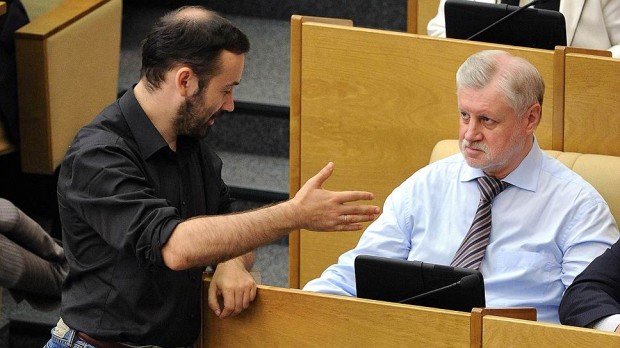
Russian deputies Ilya Ponomarev (left) and Sergei Mironov (right). Photo by Dmitry Dukhanin/Kommersant
Mironov called for Ponomarev to turn in his mandate as an elected deputy because he believes the annexation of the Crimea was “a hypocritical and base act by our authorities.” He called him a “Vlasovite” and urge him not to “trample his family honor in the mud.” Ponomarev said in response that Mironov himself “has sat under the Vlasov flag for 20 years” and that he had no intention of leaving parliament because he had to defend the interests of voters “betrayed” by Just Russia.
Vlasov was the Red Army general who collaborated with the Nazis in World War II; it was a staple of Soviet propaganda — and now current vilification campaigns — to call any dissident a “Vlasovite.”
Ponomarev put Mironov’s remarks in perspective in a Facebook post (translation by The Interpreter):
“Each spring for the May holidays, S.M. Mironov asks me to turn in my mandate. Last time this occurred after my trips around Europe where I was the only representative of Russia — the Foreign Ministry slept through this situation! — trying to talk Europeans into not forcing European integration on Ukraine, warning them of problems to come. But Mr. Mironov was afraid of criticism on the Rossiya television channel then (which falsely reported that I was supposedly traveling to meet Givi Targamadze [accused of training Bolotnaya demonstrators–The Interpreter]), and feared the punishment of the top leadership of the country and hurried to disassociate himself from his fellow party member. A knife in the back. I didn’t start criticizing the party then or committing abrupt acts; time showed that I was, unfortunately, right in my fears. We have a huge conflict in Ukraine.”
Now, continues Ponomarev, Mironov is at it again because of fear that he will be punished for not controlling his faction, but cites a number of other deputies characterized as not loyal to the party’s line. There will be consequences with voters, Ponomarev cautions, and invokes the Novosibirsk mayoral elections, where a Communist, not a Just Party leader was chosen as the united opposition candidate and won, after Ponomarev himself withdrew from the race.
The episode illustrates how complex motivations for actions can be for deputies and their understanding of their own politics; on the face of it, it seems that Ponomarev was a lone dissident over the Crimea, with a position similar to the West, but in fact, he was merely for taking more time on the issue to negotiate further with Ukraine.
1708 GMT: Russian blogger Sergei Parkhomenko comments on Facebook regarding the latest court case against opposition leader Alexey Navalny. Translation by The Interpreter:
“It is curious that Bruno Leproux, who as head of Yves Rocher Vostok accused Alexey Navalny and his brother Oleg of abuses, thereby opening the way for the Yves Rosher Case, no longer works at this company.
According to his LinkedIn information, Leproux left his position in June 2013, four months after his company formally withdrew their claims against the Navalny brothers, and sent a formal letter to the Investigative Committee, in which it was stated that the Navalnys did not cause any damage to Yves Rocher, and they had no claims against them. (The documents are here.)
However, in amazing fashion, the investigation of the case continued, and the charge was not removed. And at first this was grounds for placing Navalny under house arrest with a ban on using the Internet, and now it has moved to the stage of court hearings.
But Leproux is silent. He has not said a single word in public. And it is not clear where he has gone. There is some vague indication of some unnamed Fulfillment Company/Russia in his profile.”
Currently we notice Leproux says on his LI profile “Having a break – Sport & Climbing / Biking / Reading / Cooking & Family“; his profile says he worked for PromoPost/Fulfillment Company/Russia back in 2003.
Navalny’s house arrest was extended for another 6 months last week.
Yves Rocher vs Navalny Bros. Сase.
Day 1. The judge has extended the house arrest for Alexey Navalny by 6 months. pic.twitter.com/MeAZXFVdjN
— Alexey Navalny (En) (@Navalny_En) April 24, 2014
1622 GMT: Yes, there is a great imbalance between what the US government tolerates from Russian state propaganda — RT.com and other Kremlin propaganda outlets like the Institute for Democracy and Cooperation in New York are allowed to operate in the US — but what the Kremlin tolerates from the US — USAID has been expelled and VOA has been banned in Moscow:
And @StateDept also hits back at #Russia over @RT_com and @VOA_News with this pic.twitter.com/t8sa9Lk0w9
— Kirit Radia (@KiritRadia) April 29, 2014
But we agree that there isn’t moral equivalence between the two entities for many reasons, not the least of which are that we don’t ever recall seeing any “911 truthers” or believers in clandestine alien control on VOA, and VOA is criticized and subject to Congressional oversight and reform in ways unthinkable for RT.com.
@JohnKerry @stengel Shud take stronger stand agnst hate speech that is destabilizing Ukr and it should definitely not compare RT and VOA!
— Robert Coalson (@CoalsonR) April 29, 2014
1606 GMT: Kommersant sums up the status of three pieces of legislation in the “anti-terrorism package” just passed by the State Duma. They now must be confirmed by the upper chamber of parliament, the Federation Council — where there is likely to be little debate — and then signed by President Putin. Given Putin’s rapid passage of anti-terrorism legislation last year related to the Sochi Olympics, and his remarks at the recent Russian Internet Forum about the need to control the Internet “created and still developed by the CIA,” his signature is assumed to be a given.
Irina Yarova of United Russia, chair of the Duma Committee on Security, proposed the measures after the series of terrorist bomb attacks in Volgograd. As Kommersant notes, only one of the laws is directly related to terrorist acts; it gives the right of FSB agents to stop and frisk citizens suspected of crimes in their jurisdiction. New definitions have been added to increase the scope of the definition of terrorism, including “organization of the commission of crimes of a terrorist orientation” and “organization of the financing of terrorism.”
The draft law on “anti-extremism” has been passed in the second reading and awaits its third and final reading; it increases the punishment for “organization of mass disorders” up to 10 years and for “training for mass disorders or participation in them or recruitment to extremist organizations” up to 7 years. Regional governments are told to monitor “social-political, socio-economic and others processes” in conjunction with this new law. United Russia, the Liberal Democratic Party of Russia (LDPR) and most of Just Russia supported the draft law (348 deputies out of 450).
The second law restricts the use of electronic payment systems or online “wallets” — now “physical persons” — individuals — will be completely banned from such transfers and corporate persons will have additional restrictions. Of 450 deputies, 441 approved this draft in the second reading.
The third law requires bloggers with more than 3,000 readers to register with Roskomnadzor, the communications monitoring body that functions as a state censor, and also mandates Internet companies to preserve user data for six months; 299 deputies from United Russia, LDPR, and a few from Just Russia supported this measure.
One deputy from Just Russia, Valery Zubov, voted against all three laws.
The Russian Union of Industrialists and Entrepreneurs have criticized the law requiring operators to keep six months of traffic because of the enormous costs, which they say will harm IT business.
1543 GMT: The upper chamber of the Russian parliament has yet another law restricting speech:
Совет Федерации одобрил закон о запрете матерных слов в произведениях литературы и искусства
http://t.co/SrKUUniNZ2 pic.twitter.com/kV0TKNg3Qg
— LIFENEWS (@lifenews_ru) April 29, 2014
Translation: @lifenews_ru Federation Council has passed a law banning swear words in words of literature and art.
Judging from the many colorful Russian tweets in response to this news, they don’t seem deterred by the law — at least on Twitter.
1523 GMT: Putin is preparing for complete state control of the Russian Internet, says the Russian business daily Kommersant (translation by The Interpreter):
“Worsening of relations with the West could completely change the structure of the Russian Internet market. Kommersant has learned that the authorities are discussing a package of measures for tightening control over Internet providers. These would include filtration of content at all levels of data transmission networks and a ban on placing DNS servers with the domains .RU and .RF outside of Russia, as well as a ban on linking regional and local data transmission networks to foreign Internet networks. The state will gain unlimited capacity for censorship on the Internet, fear experts and communications operators. For subscribers directly, this will mean an increase in prices and a reduction in the quality of Internet access.”
Russian law-makers have recently passed a number of restrictive measures, including a demand that foreign companies place servers with Russian user data on Russian soil and a requirement that bloggers with more than 3,000 readers register as mass media. The details for enforcement are not clear.
Kommersant cites four unnamed sources for the claims of worse to come: someone in the telecommunications industry; a federal official; and two managers of Internet companies. They say there’s a working group in the president’s administration preparing more regulation of the Internet; Kremlin spokesman Dmitry Peskov denies there is such a group.
Russia will have three levels of network data transmission, say the sources: local, regional and all-Russian. There will be a ban linking regional and local networks to foreign networks; local and regional networks will have to pass through a network of approved all-Russian operators. Filters will be introduced, and the working group proposes to strip the Coordinating Center for the RU and RF domains of its power of registration and transfer that function to a federal executive body. The working group proposes keeping requirements for television broadcasting the same, but to require licenses for communication networks converting URL addresses to IP addresses and back.
“‘There is no definition for the filtration of content. Legislative norms already provide for restriction of access to illegal and pirate content. It is possible it is a question of restricting access to content in some language, for example, English. But in that case, the proposal contradicts Art. 29 of the RF Constitution, which presupposes the right to free access to information. Introduction of a hierarchy of networks requires complete reconstruction of the architecture of the networks in the country, which will lead to additional unjustified expenses for all operators.'”
Creating DNS servers in Russia will also cost a lot, and some companies will be driven out of the market. Currently more than 10 such servers are located in the US and several others in Germany and China, says one source.
Andrei Kolesnikov, director of the Coordinating Center of RU and RF Domains said most of the DNS servers were abroad.
‘”If the proposal to transfer the DNS servers to Russia will be approved, this will provide an opportunity to simply isolate Russia in the event of a conflict, to limit the access to information on Russian Internet sites. That is, in the big picture, this is a curtain not from inside, but outside.'”
Kolesnikov said the requirement to strip the Coordinating Center of its powers didn’t make sense, as there was already a representative of the Ministry of Communications in the Center’s board who had a veto, and he had not had complaints from the government in the past.
Kommersant was unable to get any comment on the anticipated measures from Mail.ru, Yandex, Rambler&Co., Google Russia and other large companies nor from the Ministry of Communications. Ilya Massukh, head of the pro-Kremlin Fund for Information Democracy said that transferring the Coordinating Center functions to a government body “will lead to technical losses and to corruption in the market of domain allocation.”
April 28, 2014
2030 GMT: Shares in Yandex, the Russian search engine, rallied back up to $28.01 this afternoon after dropping to $23.04 this morning. The company’s value has taken a beating with more than a 10% loss from Putin’s remarks last week at an Internet conference, claiming that Yandex caved to Western pressure. Putin said he was concerned that Yandex’s business was partly registered abroad.
The Russian media has taken a closer look at the interchange that led to the negative impact. Smigid.ru reported that “a blogger” — who sounds like something of a “concern troll” — asked the Russian leader why Yandex got away with having a “dual nature” — both a search engine and “mass media,” although it was not registered as such:
“‘The Top 5 news of Yandex is viewed by several million people. Yandex nevertheless doesn’t have a media license and no responsibility as media before the law, noted the blogger.
‘I’m interested when the government will begin to make decisions that rid us of digital agression,’ said the blogger, emphasizing that he wasn’t calling for closing Yandex.”
Ekho Moskvy published the whole transcript of the discussion on the Russian Internet with Putin, and identified the blogger as Victor Levanov.
Пока вы там ржали над моим вопросом и изящно подтрунивали над "цифровой агрессией", спецслужбы США теперь.. http://t.co/tNGXF11RYP
— Виктор Леванов (@viktorlevanov) April 27, 2014
Translation: @viktorlevanov While you were all roaring about my question and bantered so sophisticatedly about “digital aggression,” USA intelligence agencies have been gaining the right to crawl on to the servers of all countries.
Levanov wasn’t specific about what he meant, and also tried to claim his comment about aggression referred not to Yandex but cyber-attacks.
Meanwhile, a group of Red Army soldiers planned a picket today at Yandex’s offices to complain about search results they said favored Hitler, by showing him as a scene-writer.
2000 GMT: Rumors flew through the Russian blogosphere last week that popular blogger Anton Nossik (@dolboed) was predicting that Russian authorities would block Facebook and Twitter within two or three weeks. But the articles in tabloids never linked to any actual blog post of Nossik’s, and we could not confirm this. Even so, the prospect is being avidly discussed by bloggers and their faithful readers.
Last week the Russian parliament passed new laws not only further restricting bloggers, but mandating foreign Internet companies to place their servers with Russian user data on Russian soil — where it would be accessible to Russian intelligence.
These developments particularly worried Russians who in recent years, since Putin intensified a crackdown on dissenters, and particularly in the months since the Crimean annexation have fled censored Russian services for American platforms like Twitter and Facebook. For some time, active Russian bloggers have been telling each other to move from LiveJournal, where some critical blogs have been blocked, or VKontakte (VK), whose founder left Russia last week after refusing to turn over user data, to Facebook or other social networks where they imagined they might be more secure:
@dolboed Не жди, когда раздастся в дверь стук-уходи с VK на Facebook! pic.twitter.com/UXDCXWiiwL
— Robert B (@RobertBik) April 22, 2014
Translation: @RobertBik Don’t wait for the knock at the door — leave VK for Facebook!
Now there’s the prospect that these US sites could be blocked if they refuse to comply with requirements to put their servers on Russian territory.
Russian conservatives see themselves as under assault from Western social media, says Moscow News:
“State Duma Deputy Sergei Zheleznyak, in his speech to dozens of high-ranking officials, described the situation as an ‘information war’ that posed a threat to Russia.
‘Roskomnadzor stands at the forefront of the information war that was unleashed against our country and our values,’ Zheleznyak said.”
Some observers have seen a parallel to China’s increasing crackdown on the Internet:
“‘We are one step away from the Great Firewall of China; in any case, the Russian government now has all the instruments necessary to limit the work of foreign social networks here,’ said Andrei Soldatov, a prominent security analyst.”
1960 GMT: Remember all those right-wing and even neo-Nazi European parties that sent observers to the referendum in the Crimea, pronouncing it “free and fair” for the Kremlin? It was hard for Putin to make the claim that the Kiev government was “fascist” with friends like those “observing” for him.
But far from being an aberration, what we’re seeing is that such ultranationalist parties naturally gravitate to Russia these days as they find it compatible — even if they are far less popular at home:
#Bulgaria's 'far-right' party ATAKA kick-off European elections campaign in… Moscow. #Putin's reach extends pic.twitter.com/kBfOicdc6s
— Nikolay Nikolov (@Nikolay_Nikolov) April 25, 2014
Bulgaria's far-right Ataka party is polling at two percent #EUelections – http://t.co/MmUxf8HmsN
— EUobserver (@euobs) April 28, 2014
1959 GMT: With Western sanctions biting harder, Russia is already casting around to reinforce an old connection that annoys the US (Foreign Minister Sergei Lavrov was off to Cuba today) and promote stronger partnership with Bahrain, a serial abuser of human rights that won’t have to hear complaints from Moscow about its record.
“During the visit the Government of Bahrain announced revising visa policies for Russian citizens traveling to the Kingdom of Bahrain, with the aim of encouraging business and trade between the two countries, which reached $134 million in 2011. Simultaneously, Gulf Air, the national carrier of Bahrain, announced the launch of a new direct route from Moscow to the Kingdom. This announcement is in response to growing demand from businesses wishing to travel between Russia, Bahrain and the GCC.”
Lavrov also plans to visit Peru, which recently purchased 24 Russian helicopters.
1944 GMT: The US Treasury announced today a list of 7 new persons and 17 entities to be sanctioned in Russia in retaliation for the forcible annexation of the Crimea and ongoing Russian hostilities against Ukraine.
The State Department has described the persons and companies targeted; notably among them is Igor Sechin:
“Igor Sechin is the President and Chairman of the Management Board for Rosneft, Russia’s leading petroleum company, and one of the world’s largest publicly-traded oil companies. Rosneft is a state-owned company and has not been sanctioned. Sechin was formerly the Deputy Prime Minister of the Russian Federation from 2008 until 2012. Additionally, from 2004 until 2008, Sechin was the Deputy Chief of Staff for President Putin. Sechin has shown utter loyalty to Vladimir Putin – a key component to his current standing.”
Sechin is often seen as the key silovik, or power minister (or former minister) controlling the military-industrial complex in Russia. Recently, Putin has charged him with furthering economic relations with China, as relations have worsened with the West.
Kommersant, the Russian business daily, ran an upbeat headline “Investors Liked the Anti-Russian Sanctions,” reporting that after an initial dip, Russian stocks on the Micex rallied with the news of further American sanctions:
“The announcement of the new USA sanctions regarding Russia caused an increase on the Russian stock market. If at the opening of trade, the Micex fell by 1.5%, then with the appearance of the new measures, the effects began a confident rise. By 17:30 Moscow time, the Micex had risen until benchmark of 1291 points, which was almost by 2.5% higher then the minimum of today’s trades and by 1% of the close on Friday. The RTS rose 1.5%, to 1156 points.”
As of this hour, the RTS had risen further by 1.78%.
But as we point out in our Ukraine Liveblog, this rally doesn’t make up for the losses of recent weeks, and is modest at best. The shares in Sechin’s own companies fell by 1.9%, Reuters reported.

